 Leading Blog | Posts by Month |
 Leading Blog | Posts by Month |
07.30.07

In A World Of Accelerating Change, It Takes Bold Leadership What does he mean by bold leadership? In terms of a government's leadership style, Bush noted that it is critical for an administration to rethink what they are doing. “A lot of times, the way we do things is because we have been doing it that way before, not because it is rational, not because it improves the human condition or creates the chance for people to pursue their dreams, but because we have been doing it that way. So in a world where change is happening a lot, whether the government is changing or not, it is important for leadership to have a healthy disrespect for the status quo. You won't change everything but the things that don't work need to be changed and without leadership, this won't happen." This thought is echoed in Jim Tompkins’ book, Bold Leadership for Organizational Acceleration. In it, he addresses three important aspects of bold leadership—the inspirational leadership that drives an organization, outsourcing those areas outside your core competencies, and the importance of a Plan B. Tompkins states. "Leaders must not only be bold if they want to thrive today, but they must also develop bold companies—encouraging boldness in all aspects of the organization." To do this, “Leaders must, therefore, teach others how to be leaders. Their strategies must be flexible and innovative. They must challenge the established view of a leader as someone who leads and demonstrate that leadership means inspiring others to lead. They must have the courage and spirit to move from wherever they are to further their abilities to lead others into getting extraordinary things done. In other words, these leaders must practice Inspirational Leadership."To make this happen Tompkins suggests that leaders look at the big picture to locate and deal with those “parts of the picture that are just filling up canvas and not adding value to the subject.” Tompkins adds something that I think underscores the importance of this point. “Actually, it is not enough just to look at the big picture. If your picture is in a frame, you need to look at the frame too. Is it possible that the frame is the important part and the picture inside it needs to be changed or removed? ... Or is the frame that holds the picture rotting or overpowering the picture so that it is totally lost?” Perhaps it’s time to look at what we are doing and ask if we need to be doing it differently or if we need to be doing it at all.
Posted by Michael McKinney at 04:00 AM
07.27.07

Remarkable Leadership: The Kevin Eikenberry Interview Part 3
THIS IS the final post of our interview with Kevin Eikenberry author of the book Remarkable Leadership. Kevin Eikenberry maintains a blog on his web site. LeadingBlog: One thing that gets bantered around a lot today is the idea of the leaderless organization. Do you think that there is such a thing? 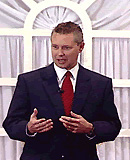 LB: I would agree with you completely. I don't think there is such a thing as a leaderless organization in that there is nobody at any given point at the helm. It may be shared, but that there’s nobody in that role, no. KE: Remarkable Leadership isn't even out yet as we're talking now, but I'm already working on what the next book is going to be and that is Remarkable Followership. It’s that role we play as followers. If all of us are leaders then all of us are also followers. And what does it look like as a job title or whatever? How do we still be a highly productive, engaged part of the team? LB: I think that’s really important. That’s one area that I don't think people understand — even people in leadership training — because they get the idea that I'm a leader and so I'm not a follower. Either, or. But throughout the day, sometimes I'm a leader and sometimes I'm a follower. It changes depending on the situation. A good leader knows when to follow. KE: Yes. Let’s just take the microcosm of a meeting. Within a meeting, a remarkable leader, a good leader, is going to be a leader and a follower over and over and over throughout that meeting – or maybe neither and be a facilitator (neutral). So, it’s really about role and understanding that all of us have to lead and follow. If everyone is leading and no one is following then there’s really no leader either. There’s the need for both roles and I think in reality for us to be truly highly functioning professionals, we need to master both of those roles. LB: Absolutely. Finally, what do you think is the biggest factor that prevents someone from becoming a remarkable leader? KE: Oh, to me that’s easy. The biggest factor that prevents it is belief. People don't think it’s possible: “I'm not a leader.” “Someone else is good at that, that’s not me.” “That’s not the thing that I'm good at.” “I don't see myself as that.” “My Dad wasn't a leader so I can't be a leader.” It’s not about potential, it’s not about possibility – yes, there are opportunities, there are development situations where some people have had great mentors and great opportunities and that sort of thing, but in the end, even if you have been given the opportunity to work with a great leader or have a great mentor or have had an amazingly fortunate opportunity, I believe, if you don't believe it’s possible for you to become that, it’s not going to happen. You're not going to see the opportunity. You're not going to take it. So to me the number one factor is belief.
Posted by Michael McKinney at 12:23 AM
07.26.07

The Consultant’s Tightrope: Knowledge-Innovators vs. Knowledge-BrokersThe British Economic and Social Research Council released a study led by Professor Andrew Sturdy, of Warwick Business School at the University of Warwick in the UK on The Evolution of Business Knowledge. Contrary to popular belief, the study concluded that, “management consultants are, like their immediate clients, more 'knowledge brokers' than innovators. Both groups are often more concerned with managing projects and getting the job done.” "Typically, they are seen as outsiders, bringing ideas and organizational techniques which are new to their clients. But in reality, we found that prospective clients were unlikely to welcome consultants if their knowledge was 'too new'." Perhaps this isn’t too surprising since consultants are themselves operating a business and must please the client as well. Sturdy explains: “the study findings suggest that consultants walk a tightrope between offering what might be seen as either a ‘helpful’ challenge or an unconstructive interference. So whilst clients were generally happy to be challenged, this was only if the consultant did so sensitively, showing a good understanding of the business. “Consultants also needed to earn the respect of staff at all levels in the organization - something best achieved by demonstrating intelligence, commitment and willingness to engage with its problems, and respecting the knowledge of its employees. Professor Sturdy said: "The real outsiders then, are those people not directly involved in the project team, often including the most senior management and the rest of the client organization. "This is important, as it means that consultants are not as innovative or different as is often thought. But this can help in their role as knowledge-brokers. The main barriers then become the initial selling process, and later the implementation; typically still the preserve of managers more than consultants."
Posted by Michael McKinney at 02:02 PM
07.25.07

Remarkable Leadership: The Kevin Eikenberry Interview Part 2
OUR interview with Kevin Eikenberry author of the book Remarkable Leadership continues. The final part will be posted on Friday. LeadingBlog: In your book, Remarkable Leadership, you divide teams into two types — basketball teams and track and field teams. Could you explain that? Kevin Eikenberry: You obviously read the book. LB: I did.  LB: So what we're trying to do really, is force track and field participants or teams into basketball teams? KE: I think that happens far too often. I've been on teams like that and I have been in situations like that and I have seen it many times. I've tried to help individual teams and organizations think about it. Most organizations have both kinds of teams and the problem is that leaders try to treat both the same because they've never thought about the differences. LB: You wrote in your book that “remarkable leaders don't delegate, they share responsibility.” What do you mean by that? KE: Well, you know I asked a lot of people about the “delegate” word. The interesting thing that I got was, there’s not a lot of positive feelings around the word delegate. I think that maybe it’s a bit of a play on words but I think that when leaders are thinking about delegating at least in my experience—anytime I think about any book I've read about being a more effective leader or manager and it talks about delegation, it’s talking about handing things off so you can do something else—and when you think about delegating from the perspective of handing things off to others so I can do something else, you're not doing it in support of the other person. You're just doing it in a somewhat selfish way to give me time to do something different, however valuable that might be. I think that the difference is in the focus. The focus of thinking is about sharing responsibility—it's not “I'm sharing this with you, yet I'm going to be free to do something else” but “I'm sharing this with you to help you grow, to help you to get to the point where you can do my job, or that we collectively can be more productive or whatever that looks like.” But really I think its as much about what’s the underlying reason for the activity. Remarkable leaders think about it from the perspective of how’s that going to impact positively the other person and the organization. I know that if I'm thinking about it that way Michael, I'm going to do a better job of handing-off that task—whatever we're going to use to call it. If my intent is about helping the other person be more successful, building their skills, increasing their accountability, whatever that looks like, if my intent is to help them, then I'm going to be much more successful at doing it whatever I call it. So the difference is not so much about the semantics, but the intent. I'm using different words to try to help describe that intent. I may have just done a better job of describing it here than I did in the book. I don't know. LB: That caught my eye in the book because everything you read says delegate. KE: Everybody that I talked to—and that’s one of the chapters that as I was writing that I spent a lot of time calling people, calling colleagues, calling friends, (and the next book I'd be calling you—you're one of those people that I'd ask) everyone had this whole thing about delegating—both as being delegated to and delegating—not a positive thing. I'm thinking, you know, wait a minute, these are opportunities for learning and development and growth, why is it that they don't feel that way. And I tried to back into this whole idea of intent and I think that’s where the difference is. LB: Well, that makes good sense. I was wonder about delegating those tasks where we know we are weak … if you're doing it in the sense of a shared responsibility then that would make sense wouldn't it? KE: That’s exactly right. And I think remarkable leaders do recognize their strengths verses the strengths of the other people on their team. And hopefully, we are self-aware enough to know what it is that we want to be sharing based on what our strengths are. And we're aware enough of the strengths of our team members to be sharing things with them that matches their styles or strengths better. I think as remarkable leaders we recognize that we're better off when we put the right work in the hands of the people that have the strengths to handle it. It doesn't necessarily mean the experience or knowledge as much as the strengths. I think that remarkable leaders figure that out well enough and try to share the work in a way that makes the most sense. 
Posted by Michael McKinney at 07:24 AM
07.23.07

Remarkable Leadership: The Kevin Eikenberry Interview Part 1 THIS WEEK—Monday, Wednesday and Friday—we will feature an interview with Kevin Eikenberry author of the book Remarkable Leadership. Kevin is the Chief Potential Officer of The Kevin Eikenberry Group, a learning consulting company that provides a wide range of services, including training delivery and design, facilitation, performance coaching, organizational consulting, and speaking services. Kevin believes that remarkable leaders are developed. Remarkable Leadership identifies the 13 competencies of remarkable leadership and offers a proven method for applying those competencies at any level of leadership. The book is thought-provoking and easily applied. In this interview, Kevin will share his thoughts on leadership development, lifelong learning, teamwork, delegating, followership and the biggest factor that could prevent you from becoming a remarkable leader.
THIS WEEK—Monday, Wednesday and Friday—we will feature an interview with Kevin Eikenberry author of the book Remarkable Leadership. Kevin is the Chief Potential Officer of The Kevin Eikenberry Group, a learning consulting company that provides a wide range of services, including training delivery and design, facilitation, performance coaching, organizational consulting, and speaking services. Kevin believes that remarkable leaders are developed. Remarkable Leadership identifies the 13 competencies of remarkable leadership and offers a proven method for applying those competencies at any level of leadership. The book is thought-provoking and easily applied. In this interview, Kevin will share his thoughts on leadership development, lifelong learning, teamwork, delegating, followership and the biggest factor that could prevent you from becoming a remarkable leader.
LeadingBlog: How do you define a Remarkable Leader?  LB: What is wrong with how most organizations do leadership development today? KE: The main thing that is wrong with what most organizations are doing is that they think of leadership development as being about events. We always say, “training is an event, learning is a process.” And it’s the same thing for leadership development. Organizations are looking for the magic pill, they've identified people as high performance or their next leader or “they've been a supervisor for three years so we'd better give them some training.” So leadership development looks like this event, this workshop, this seminar, this whatever, and when they've done that they've checked that box and that’s their leadership development process. I think the smartest organizations are looking at it differently. They're looking at leadership development much more holistically. They're thinking about a wider variety of activities, and experiences and processes. Anything from different sorts of assignments, different sorts of projects to application projects, to the chance to be coached or coach others, mentoring programs and a whole host of other things, put together specifically to work best for that organization. So in short, what’s wrong is that people are thinking about leadership development like they do most training and that is as events as opposed to thinking about a process in terms of what really makes learning work. LB: So more of a long term thing? KE: A long term thing, but an integrated thing. Integrated with the work. You could have training that is long term right? You could have a class this week and next month and four months from now and 21 years from now and all that sort of thing, but the real challenge is, I think, integrating it back into the work so that people can go back and really apply what they're learning. LB: You place a lot of emphasis on learning? Would you say that the ability or the desire to learn is the most fundamental skill of the remarkable leader? KE: That’s like the big softball for me. One of the early chapters in the book talks about that very thing. I do believe that the number one skill of a leader—the underlying core skill of a leader—is their ability to learn. Because, if we want all of these kinds of things in our employees or those we lead—we want flexibility and collaboration, and we want them to continually grow and we want them to develop and we want those things for them—then number one, we had better be doing those things ourselves. And secondly, if we want to continue to build our skills—as I said a remarkable leader is someone who does continue to build their skills—that means by definition, that we have to be ongoing, or as I say in the book, continual learners. To me, it is the fundamental underlying skill. And Michael, when I work with groups, I'll ask them when they think of the best leaders they've ever experienced, make me a list of their characteristics, and people will come up with a long list of great attributes, but they won't come up with the word learning. But without learning most of those other things aren't going to happen. LB: So you don't think leaders are born? KE: I don't. I don't think leaders are born. I think that all of us have a unique bundle of gifts and talents that are a part of our DNA and although there are some people that may have some innate skills that help them become some parts of the leadership process more easily—just like there are some people that innate skills that make them better mathematicians or musicians right? But I think just like those things that challenge us as a leader, is to play on our greatest strengths—to utilize our greatest strengths—to become more effective leaders. Because in the end, being a highly effective leader is about being a highly effective human. There are many different ways to lead and the challenge is finding the voice that we best lead with and build on those strengths first. LB: Good. How would you improve your learning ability? Or make the time for it? Sometimes we get so busy that we put “learning” off because we don't have time for it. KE: Absolutely. That’s why, when I started to write the book the learning competency was that remarkable leaders are continuous learners. And I don't think that that’s really true. We're not continuous learners. We're doing all sorts of things and although as human beings we are learning beings, we are not necessarily continuously, consciously learning. The kind of learning we are talking about here is conscious right? And so, I think it’s much more about being continual. On an ongoing basis as opposed to continuous—in every moment being a learner. I think that’s too high a bar to set for ourselves. I think the challenge for us all is that first of all we have to figure out how to make the time for it and the way to do that is to find opportunities. I think if I could encourage people to do just one thing that would make them a more effective continual learner—and it doesn't necessarily take a lot of time, it takes change of a couple of habits—that is that we would just take time to reflect more on our day; thinking about what worked and what didn't, what we want to repeat and what we don't want to repeat, and what we learned that we want to do differently the next time. If we would take 20 minutes every day to do that we would improve so rapidly I think it would be quite amazing. And the way we do that is to, first of all, make a conscious effort to do it. You say, “Well I don't have 20 minutes.” but yeah you do. Because you drive home from work and you listen to the radio or you take your walk and you listen to your I-pod or watch television in the evening, I think there are lots of times we can steal 15-20-30 minutes a day to do these kinds of things. It’s not like reading … having a book in hand or any of those other things. It’s just closing our mind down enough from other things to give ourselves a chance to reflect. And in the end, a learning process has to include a reflection process or we can't learn from our own experiences. I think that that is too often left out. And we're in such a rush to move from one thing to the next—from doing one tele-seminar to another interview, to do another phone call, right?—that we don't take the time to just stop take a mental deep breath and really think about what worked and what didn't. So if I'm going to do a better job in my next interview, I'd better stop and spend a little time thinking Michael, about what went well on this one or not. And I think that is the key for us to become continual learners. If I could say one thing, it would be take the time, make the time to reflect and ask those reflective questions. 
Posted by Michael McKinney at 03:23 AM
07.22.07

Newswire: Wall Street Versus Main Street
Posted by Michael McKinney at 08:50 PM
07.20.07

MBA-by-Blog  Rob May before selling his website, BusinessPundit.com came up with the idea of creating an MBA-by-Blog. Rob May before selling his website, BusinessPundit.com came up with the idea of creating an MBA-by-Blog.
The idea was to create a directory of some of the best and most educational business blog posts of all time. Primarily, it would have been useful as a learning tool for specific business topics of interest to you. Additionally, it would have been a great research tool.
Posted by Michael McKinney at 12:43 PM

Neuroleadership and You
 There is the hope that when applying a science to leadership, one can make it as mechanical as possible. Neither benefits when this is the goal. If we want the science to bring us laboratory results that we can apply in the real world, we will be disappointed. I would agree with Warren Bennis, quoted in the article as saying, "It's full of possibilities. What worries me is people being taken in by the language of it and ending up with stuff we've known all along." It’s worrisome, too, that we live in a time when some people will not accept common sense unless there are numbers behind it or a scientific study proving it beyond all doubt. There are those also who cannot find value until they have spent enormous sums of money on it. For them, the combination of science and leadership is priceless. The problem with rushing to apply a science to any field is that passion often overrides experience; we tend to throw out conventional wisdom and common sense in favor of the new. In the excitement, we begin to look for absolutes where there are none and never will be. Comparing brain waves of leaders—moral/immoral, successful/unsuccessful—to create a kind of yardstick or means of selection is off the mark and beyond the scope or intent of neuroleadership. If we are looking for it to replace intuition, judgment and thought, we are mistaken. If we want to say, “This is a good brainwave for leaders, and this is a bad brainwave,” we don’t understand the human spirit. I wouldn’t expect neuroleadership to provide all kinds of new ideas. It will look at old ideas in a new way. This is often the key to finally bringing us the depth of understanding necessary to adapt ideas to a specific situation. What neuroleadership can do is reframe ideas in terms of how the mind works. Specifically, how we learn, retrieve memories, experience and interpret our world. This will provide guidance to best practices. It will reinforce some practices based on solid neuroscientific research. Conversely, it will provide sound reasons why some approaches feel forced or don’t work at all. If they go against the way the brain is wired, we are just spinning our wheels. Good to know. Leadership is not a science, and scientific methods applied to it will never make it one. But, if neuroleadership will help us understand why we make the connections the way we do, if it will show us why we need to allow people to think and learn in ways that are best suited for them, as opposed to forcing people to all think in the same manner, if it will help us to improve and leverage our own and other people’s thinking, then it will have done a big service. I look forward to what we will find in this exciting new combination.
Posted by Michael McKinney at 06:57 AM
07.18.07

The Importance of Competence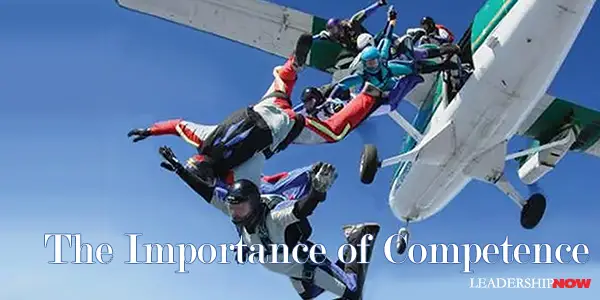
COMPETENCE alone can’t make a leader, but it can undo one. While inaction is a prime problem facing many organizations (and individuals, for that matter), there’s the very real possibility that one is doing the wrong thing. An incompetent leader has almost unlimited opportunities to be ineffective. Knowing what to do—professional competence—is vital. Being competent doesn’t mean that a leader knows how to do everything, but rather that they know what to do and how to get it done. Even the most brilliant leader who tries to go it on their own is setting themselves up for failure. A good leader will know where their strengths and weaknesses lie and thus know what kind of expertise they will need to surround themselves with. Most leaders have gotten to their station in life through their own competence, but that becomes lost on followers unless the leader’s competence is occasionally revealed by action. 
Posted by Michael McKinney at 09:52 AM
07.16.07

Making Your Team Swing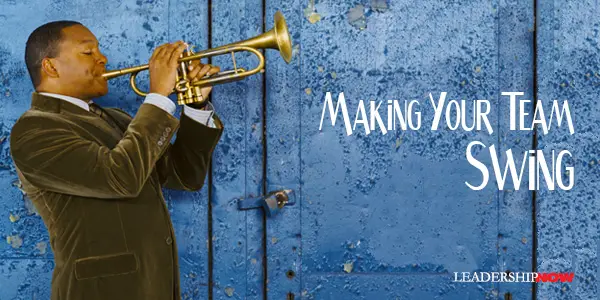
WORLD RENOWN Jazz artist, Wynton Marsalis, has some profound things to say about business and relationships that are worth reviewing. Earlier this year, USA Today's Del Jones interviewed Wynton Marsalis about principles found in both jazz and business. Marsalis told USA Today, “When you listen to great jazz musicians, you hear the respect they have for each other's abilities. During a performance, most of the musicians' time is spent listening to others. You see the trust they have for each other because they are always making adjustments and improvising based on what someone else does.” Marsalis acknowledges that trust and listening to others goes hand-in-hand, but he brought up another important point that I think applies to any functioning organization or relationship. He points to the mindset of being aware of what others are doing and making adjustments for them in what you are doing, for the sake of the whole group. It’s not pointing fingers and affixing blame. It’s being so tuned-in to others that you can absorb their mistakes and they can absorb yours without missing a beat. He calls it “swing.” Here is more on that concept: Swing is a rhythm, an era in American history, and it is a world view. In this world view, there is a belief in the power of a collective ability to absorb mediocre and poor decisions. When a group of people working together trust that all are concerned for the common good, then they continue to be in sync no matter what happens. That is swing. It's the feeling that our way is more important than my way. This philosophy extends to how to treat audiences, consumers, staff or dysfunctional families. This may seem idealistic, but think about how church congregations recite, nearly together and completely unrehearsed. They proceed by feel. Swing is the single objective. It is the core that makes us all want to work together.
Posted by Michael McKinney at 07:05 AM
07.15.07

BookTour.com: Find Out Where Authors are Speaking in Your Area

Posted by Michael McKinney at 09:21 AM
07.13.07

Seeking BalanceI wanted to share some of the commencement remarks by Columbia University president Lee Bollinger as I found them valuable to life and leadership. Bollinger stresses the role imagination plays in finding and maintaining that balance. Here are some edited excerpts to provide a little food for thought: [Imagination] is something different from knowing things and being able to reason. It’s the part of the mind that creates stories, that feels what it’s like to be someone else (and so much so that for a moment you become that other person), that grasps the essence of a human dilemma, that eagerly absorbs the complexities of complex matters, that can see how people change in different circumstances, that is always trying to improve on things, that can conceive of a world different from the one we are living in.Seeking balance too, requires keeping a long term view and personal integrity with our values and beliefs. Even in thinking about today’s big issues, it’s all too easy to jump on the band wagon of the latest speech, the newest study, or an organization’s well-rehearsed agenda. These issues are complex and need to be thought through in a well-ordered manner. Leader’s need to encourage balance in those they lead too. Lack of balance in the workplace leads to many of the hidden costs organizations face—sick days, mistakes and burnout. On a personal level, it’s important to step back and ask yourself if in your drive for personal “success,” if you are paying too big a price in your relationships with those around you, your family, friends, your health and your own personal development.
Posted by Michael McKinney at 01:04 PM
07.12.07

Having Trouble Listening?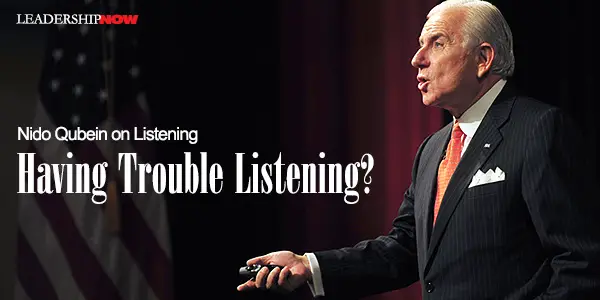
EFFECTIVE leaders will make a concerted effort to listen to and learn from those around them. In How to be a Great Communicator, author Nido Qubein, suggests that if you are having trouble listening, the following factors may be behind the problem: Prejudice: We all have biases. It’s all too easy to ignore a person because of something we don’t like or value about them. “It’s best to overcome our prejudices, but while we’re overcoming them we must learn to override them.” Jumping to Conclusions: Listening can be difficult, especially when you think you have heard it before. When you get that bored feeling and begin to drift away, bring yourself back to the present and “accept the challenge of drawing from the speaker some ideas and information that will be of value to you personally." Assumption: Related to the above, Qubein writes, “You may assume that you already know what the speaker is going to say, so your attention drifts elsewhere….Make it a game to look for something new to take away from the conversation.” Inattention: We can think almost four times faster than we can speak. In the lapse between the two it’s easy to place your attention elsewhere or begin to formulate what you want to say. In doing so you may miss important information. “The remedy is to use the ‘spare’ time to evaluate and interpret what the speaker is saying.” Selective Listening: Our minds are tuned to hear what we want to hear; those things that confirm what we already think. “Once again, the solution is to evaluate and interpret. Look for information and ideas that challenge your own ideas.” Excessive Talking: If we’re talking, we’re not listening. It’s easy to use someone else’s comment as a jumping-off point to your monologue. “Be conscious of the amount of time you spend talking, and be alert for signs that your listener has something to say. Be willing to yield the floor at reasonable intervals.” Lack of Empathy: Try to listen from the other person’s point of view. Knowing where the other person is coming from can give you a lot of insight into what they are saying. Fear: When you don’t like what someone else is saying or if you think it might make you look bad, instead of listening, we often begin to formulate an argument or begin to plan our escape. Force yourself to hear the other person out. Qubein cites Patrick Henry, “…Whatever anguish of spirit it may cost, I am willing to know the whole truth; to know the worst, and to provide for it.” 
Posted by Michael McKinney at 10:03 AM
07.10.07

Six Disciplines for Excellence: Decide What's ImportantNow in its new and improved second edition, Six Disciplines for Excellence by Gary Harpst is still one of the best field guides to business. It lays out a practical methodology to help you stay aligned with your mission using sound foundational principles. Through a series of repeatable annual, quarterly, weekly and daily cycles, this methodology will help you to successfully guide your business and quite frankly, your personal life as well. Not surprisingly, you will find that these disciplines are applicable to your personal life, because we are all subject to some of the same pressures that are present in any other system.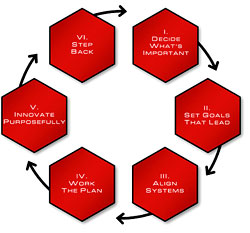 I find that the most vital principle presented here begins with step one: Decide What's Important. Its importance is underscored in the fact that it is woven throughout the process and culminates in step six. The practice of repeatedly stepping back and asking how did we get here? and why are we doing what we are doing? is vital to sustaining any system. While this is probably one of the most intellectually understood behaviors, it is in practical terms, likely the most overlooked discipline he presents here. It is overlooked because the pressures of the present lead us into directions and practices that we never intended and are often counter-productive. So we put it off, intending to address it later. Unfortunately, later rarely comes and the inconsistencies we create only breed more inconsistencies. Unnecessary actions and behaviors hang on long after their usefulness is gone. In business and life, we need to continually step back and reconsider what we are doing. Sometimes life happens – things happen we can’t plan on - and in the swirl of it all, we find ourselves doing that which we otherwise would not. His methodology helps to you to become more proactive and eliminate the tangents that distract you from what you should be doing. Harpst writes: Businesses are “systems” and they’re subject to forces similar to entropy. Once a small business makes plans, the chaos of everything changing around it gradually erodes those plans, like the warm water melts the ice. An organization must have a systematic and ongoing way to offset those forces, or it will eventually become ineffective to the point that its survival will be at stake. Or, using a different analogy, Stephen Covey once said, “We are too busy driving to get gas.”
Posted by Michael McKinney at 08:49 AM
07.08.07

Best Leadership Blogs of 2007 The voting is now over. Thanks for all of the support. It was a great win-win promotional opportunity. It introduced a lot of new people to these blogs. Thanks to Kevin Eikenberry for putting it together. I met some great people along the way like Jonathan Farrington and Phil Gerbyshak whom I had not connected with before. The voting is now over. Thanks for all of the support. It was a great win-win promotional opportunity. It introduced a lot of new people to these blogs. Thanks to Kevin Eikenberry for putting it together. I met some great people along the way like Jonathan Farrington and Phil Gerbyshak whom I had not connected with before.
I wanted to take this opportunity to ask you for any comments you might have regarding this blog. What do you like? What could be improved? Leave a comment or E-mail me. Soon, we’ll have more about Kevin Eikenberry’s upcoming book Remarkable Leadership to be released next month. So stay tuned!
Posted by Michael McKinney at 03:53 PM
07.06.07

JFK’s Leadership Style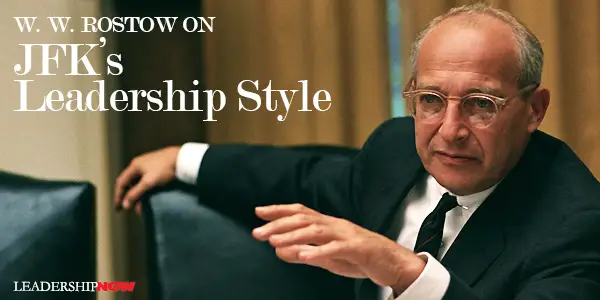
AS WE HAVE discussed before, the idea of the great leader as sole player is flawed. The point leader can’t do it alone. It takes many leaders to support the point leader. John F. Kennedy is said to have wondered how a man could conceive of seeking the job of the president when the problems were obviously bigger than mortal man should have to handle. It can only be done through people in an environment where they can do their best. Good relationships are vital to the success of any leader. 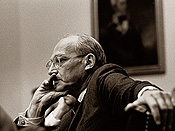 The late W. W. Rostow served as Deputy National Security Advisor to Kennedy. His observations of Kennedy’s leadership style are instructive: It did not fit the hierarchical pyramids to be found in textbooks on administration: it was like the spokes of a wheel. When he formed a bond it remained firm. His enormous energy permitted him to deal with a great many people on a bilateral basis, weaving their efforts into his tasks as he saw them. His method was that of the extended family. He put each member to work in ways that could help, according to his talents.Kennedy was able to create an environment without too many layers that fostered more open communication. At the same time, this requires thoroughness on the part of the leader so as to be certain that each task is covered by a capable person, while coordinating and leading in a way that doesn’t become dictatorial.
Posted by Michael McKinney at 01:12 AM
07.04.07

All Team Members Should Be LeadersBritish Rugby team England, has enlisted the help of the Royal Marines in Dorset to develop the leadership necessary to create a winning team. Brian Ashton, the head coach is making use of outside consultants too, to bring this team together. It points to the fact that every member of a team needs to operate as a leader, whether they are the point leader or not. An effective team leader will be make sure that all aspects of a task are being covered and that they are coordinating without being dictatorial. This requires a lot of give and take. Additionally it is important that all members of a team know what everyone else is doing so that they can adjust and align themselves to the problems that any other team member may be facing. The article continues. “’You need to pull players together, put them in a hostile and uncomfortable environment where they must work together to be successful, and they have done that.’ Some of the exercises designed by the Marines involved sensory deprivation, testing the ability to make decisions in extremes of tiredness….’This is the first time this group of players has been fit and available and the process of bonding as a group has been accelerated,’” Ashton said.
Posted by Michael McKinney at 09:13 AM

The History of the Fourth of July Happy Fourth of July!
Posted by Michael McKinney at 09:03 AM
07.03.07

Leadership Books: July 2007Here's a look at some of the best leadership books to be released in July.




Posted by Michael McKinney at 08:17 AM
07.02.07

The Great Brain Robbery
IN another post I quoted Will and Ariel Durant’s observation that out of every hundred new ideas ninety-nine or more will probably be inferior to the traditional responses which they propose to replace, comes a related idea. It may take a dose of humility to accept, but whatever problem you are faced with—whether personal of professional—someone else has faced the same problem and solved it. Although it sometimes gives us comfort to think we are different, we are not totally unique in this way. Paul Sloan, author of The Innovative Leader, says that we should harness other people’s solutions. Ray Considine called it The Great Brain Robbery. Baseball Hall-of-Fame inductee, Bill Veeck said, “There’s nothing wrong with stealing other people’s ideas. And anyone who doesn’t is presumptuous. Because there simply aren’t that many new ideas. You simply take something used somewhere else and adopt it for your own use.” These people aren’t talking about plagiarism. What they are saying is that we should find ideas that have worked for others and adapt them to our own life situations and to make them our own. By careful observation, you can start where others have finished and be the better for it. This is part of the thinking behind listening to others (especially your elders), reading biographies and histories. Armed with the knowledge of what others have done, you can jumpstart your problem-solving capabilities.  Sloan adds, “A successful innovation in your business does not have to be an all-new invention. It just has to be something new to your business that is beneficial…. Maybe every consulting firm does it but yours is the first doctors’ surgery to try it.” You need to cast your net widely and look around for connections in otherwise unrelated fields and disciplines and make their solutions your solutions. What can you adapt? 
Posted by Michael McKinney at 10:43 AM
|
BUILD YOUR KNOWLEDGE


How to Do Your Start-Up Right STRAIGHT TALK FOR START-UPS 
Grow Your Leadership Skills NEW AND UPCOMING LEADERSHIP BOOKS 
Leadership Minute BITE-SIZE CONCEPTS YOU CAN CHEW ON 
Classic Leadership Books BOOKS TO READ BEFORE YOU LEAD |
|